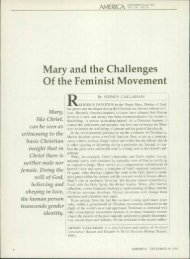Download PDF - America
Download PDF - America
Download PDF - America
You also want an ePaper? Increase the reach of your titles
YUMPU automatically turns print PDFs into web optimized ePapers that Google loves.
Great: How Religion Poisons Everything.Islamic and Christian fundamentalism receive the lion’sshare of criticism, but Catholicism does not escape attack.Harris skewers Catholicism for its anti-Semitic history, theevils perpetrated by the Spanish Inquisition and theCatholic leadership’s scandalous protection of clerical childabusers. Hitchens joins Harris in mentioning the scandal ofsexual abuse but also lampoonsCatholicism for itsWe must ask ourselveswhether there is anything inour Catholic culture thatinvites these attacks andmight be avoided withoutabandoning what is essentialto our faith.supposed reliance onsuperstition and condemnsits pursuit of power inorder to control the livesof others. Almost all ofthese critics challengeCatholicism’s dogmatismand overbearing exerciseof authority, which theysee as directly opposed tothe use of human reasonand the primacy of conscience.The committed Catholic(indeed, the committed practitioner of any great religioustradition) is bound to bristle at the aggressive tone andthe tendency toward caricature and sweeping generalizationthat runs through these works. It is tempting simply to dismissthese attacks. Yet the Second Vatican Council’s mandatefor respectful engagement with the critics of faithinvites an alternative course of action. We must certainlydefend the integrity and reasonableness of our deepest religiousconvictions, but an adequate Catholic response mustgo beyond traditional apologetics; we must also ask ourselveswhether there is anything in our Catholic Christianculture that invites these attacks and might be avoided withoutabandoning what is essential to our faith. I focus onthree elements in the Catholic faith that call for our attention:Catholic practices that suggest a naïve theism; thenature of Catholic truth claims; and the exercise of churchauthority.Naïve TheismAs Michael Buckley, S.J., pointed out in his classic study ofatheism (At the Origins of Modern Atheism), all forms of modernatheism are parasitic upon a particular form of theism.The proponents of the new atheism presuppose a naïveform of theism that perceives God, as Karl Rahner put it, asan individual being, albeit the Supreme Being, who is simplyanother “member of the larger household of reality”(Foundations of Christian Faith). Yet the god of this naïve theismmore closely resembles a benevolent Zeus than the godof the Judeo-Christian tradition. One imagines a god standingon the sidelines of human history but occasionally interveningin the course of human events. Still, we should askourselves whether there are popular Catholic beliefs orpractices that may, however unintentionally, support suchnaïve theism.As one example, consider the procedures for the canonizationof saints. Vatican regulations require that for beatificationone verified miraclebe attributable to the“servant of God”; for canonizationtwo arerequired. In these rules,miracles are described asevents attributed to theintercession of the servantof God and certified asinexplicable according tomodern science. Withoutdenying the possibility ofsuch events, I wonderwhether the emphasis ontheir scientifically inexplicablecharacter risks givingthe impression that God’s action in the world cannot bereconciled with a scientific account of the workings of ourphysical universe. Does this interventionist view of divineaction invite accusations of superstition and caricatures ofdivine activity by those outside the community of faith? It isvital that our religious beliefs and practices affirm a fundamentalcompatibility between divine action and scientificaccounts of our world.It may be opportune to consider revised procedures thatwould focus less on the scientifically inexplicable and moreon diverse testimony to the continuing influence and impactof the servant of God on those who remain on their earthlypilgrimage. Pope Benedict’s recent encyclical on hopemakes effective use of the lives of select saints as movingembodiments of Christian hope. I suspect that it is thisevangelical witness rather than the verification of miraculousinterventions that the contemporary skeptic is morelikely to find compelling.Catholic Truth ClaimsWe have not been left on this earth to wander blindly insearch of the divine. Catholics believe that God communicatesthe divine self to us in revelation. This revelation hasbeen mediated in various forms throughout human historyand has achieved its unsurpassable form in the person ofJesus of Nazareth. The Spirit-inspired testimony to thisdivine revelation is found in Holy Scripture and continuesto unfold in the tradition of the church. Within that tradition,the revealed message of God’s offer of salvation hasMay 5, 2008 <strong>America</strong> 13









